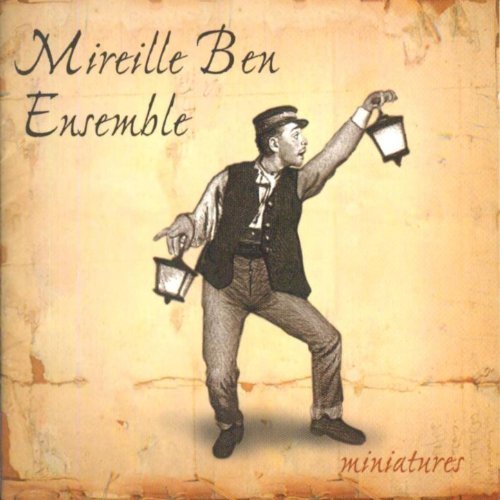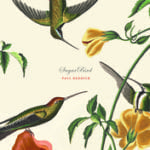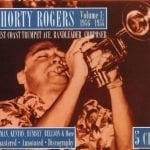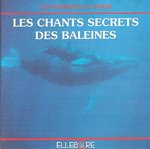Mireille Ben Ensemble – Miniatures
€13,50 €9,68
Description
Basing its work on Mireille Ben's vocal skills, the band traces back the way of the traditional Francophone songs, developing compositions through an interesting rhythmic and harmonic intertwine. It's a turning-point CD, compared to the French singerís former ones.
Track Listing:
1. Le deuil d'amour - 3:44 2. L'oiseau mis en cage - Par un beau jour - Anniversaire - 5:54 3. Au pays de Lérida - 3:48 4. Les douze mois de l'anneè - 4:58 5. Le maître de la maison - 2:25 6. Mazurka de Lanternaire - 4:22 7. C'est sur le pont de Lyon - 4:03 8. Le conseil de guerre - 4:30 9. Dedans Lullion - 5:43 10. Belle jardiniere du roi - 4:43 11. La boulangere - 2:12
Personnel:
Mireille Ben (vocals) , Oliviero Biella (guitar) , Gabriele Coltri (central France bagpipes, clarinet) , Claudia Klinzing (violin, musical saw, vocals) , Gianbattista Piantoni (drums) , Alfredo Savoldelli (double bass, bass ) , Peo Mazza (drums) , Simona Scuri (backing vocals)
Reviews:
1. Rootsworld.com - David Cox
Mireille Ben is a singer of French origin based in Italy. With her Italian band, she explores the folk heritage of different parts of France and the Francophonie on this new recording.
From the Vendee to La Louisiane, from Auvergne to Bretagne, the songs on Miniatures are of ancient origin, and found in some form wherever French is spoken and sung. Old songs, but in a new style. The treatment on this CD owes something to jazz, particularly the drumming of Gianbattista Piantoni and Oliviero Bielli's sometimes growling guitar. Alfredo Savoldelli adds electric bass to the mix.
On the other hand, the bagpipes (cornemuse), a variety originating in central France, played by Gabriele Coltri, lend an air of folk authenticity, as do Ben's smoky voice and Claudia Klinzing's musical saw and violin.
These songs - 300, 400, perhaps even 500 years old - have bounced around the old world and the new, and have been heard, like most folksongs, in a variety of shapes, with different verses, different choruses. Here and there I hear something that has come across the ocean and has entered the French Canadian tradition, recognizable despite a different title and slightly different lyric fragments; in other words, true folksongs.
These are fine songs that have stood the test of time, and well presented, with the exception of one or two on which the vocal delivery seems rushed. On "Les douze mois de l'année" Peo Mazza takes the drum kit a little too deep into an energetic jazz shuffle that takes the focus off the song itself.
There is some variety: "Dedans Lullion" is performed simply with guitar and voice, and the guitar is played in a Cajun style fitting for its Louisianan origins. (Another version of this song - sometimes called "Aux Illinois " and several others on this CD, can be found on a classic French Canadian prog-rock album by the group Garolou, circa 1978.)
Another notable track is "L'oiseau mis en cage-Par un beau jour-Anniversaire," a medley that begins with the cornemuse and strings in a baroque style duet, then swings into a waltz with the acoustic guitar providing the rhythm. The story is this: a soldier returns form the war with stories of his conquests and his intended sends him back to drink "a la santé de nos maitresses."
War, a stark reality of life in the centuries these songs come from, figures in a few other songs as well. "Le conseil de guerre" is about a soldier condemned to death who forgives his executioners. And "C'est sur le pont de Lyon" is from the point of view of a woman who wants the king to send her husband back from the front.
Although ten of the songs feature Ben's vocals, the exception is "Mazurka de Lanternaire," the one instrumental track, a real beauty where the cornemuse takes center stage. The heritage of France is in good hands on this sometimes quirky, always surprising and entertaining CD.
Linernotes:
Facendo perno sulle indiscusse qualità vocali di Mireille Ben, il gruppo ripercorre le strade della canzone francofona tradizionale sviluppando composizioni dalla ricca miscela ritmica ed armonica. Un disco che segna una svolta rispetto ai precedenti lavori di questa grande cantante transalpina.
Il disco
Partendo dai dipinti orientali del 1700, l'idea è di proporre al pubblico delle canzoni che raccontano una storia come quelle rappresentate in un quadro. Il narratore non è più lo spettatore che guarda il dipinto, mai il cantante (in questo caso Mireille Ben) che, con delle parole, descrive quello che vede: il testo della canzone. I brani della tradizione francofona vengono trattati con sonorità originali e contemporanee volendo così unire la magia "antica" con atmosfere più moderne, sospese all'interno di un disegno musicale ricco di poesia e di suggestioni.
- Le deuil d'amour (Trad. Bourbonnais - Barbillat et Touraine)
- L'oiseau mis en cage / Par un beau jour / Anniversaire (Trad. Morvan - A. Millien / Trad. Nivernais - Barbillat et Touraine / G. Coltri)
- Au pays de Lérida (Trad.)
- Les douze mois de l'année (Trad. Anjou)
- Le maître de la maison (Trad. Alsace)
- Mazurka de Lanternaire (Trad. Auvergne)
- C'est sur le pont de Lyon
(Trad. Savoie - C. Servettaz) - Le conseil de guerre (Trad. Vendée)
- Dedans Lullion (Trad. Louisiane)
- Belle jardinière du roi (Trad. Bretagne)
- La boulangère (Trad. Auvergne)
Mireille Ben
Inizia la sua attività come cantante a "cappella". Nel 1973 è voce solista e tra i fondatori dei "Lyonesse" con cui svolge intensa attività concertistica e organizzativa negli anni '80 e '90, un gruppo che fa conoscere, specialmente in Italia, un vasto repertorio di musiche e canti tradizionali francesi e celtici Nel frattempo, pratica la ricerca del canto e della musica tradizionale direttamente sul campo in Francia, nel Quebec e in Ticino.
Registra diversi dischi e CD. È attiva alla Fonoteca Nazionale Svizzera quale responsabile del settore della musica popolare. Nel 1989 partecipa alla creazione della scuola di musica popolare dell'ACP. Verzasca dove insegna danze popolari francesi. Lo stesso anno, collabora alla formazione del gruppo di animazioni di strada "Bandalpina", orchestra assai richiesta nelle feste di paese in patria e all'estero.
Per tre anni è ospite del gruppo Magam con il quale produce un CD dello spettacolo "Canti e Musiche dell'Arco Alpino". Con diversi musicisti europei partecipa alla creazione degli spettacoli "MusicAlpina" (1995, regia del francese P. Beccu) e "Là-haut sur la montagne" (2000, regia del canadese R. Amyot).
Canta inoltre nel Ben-Scuri Duo, e suona con "La grande orchestra delle Alpi" nel quale rappresenta il Ticino.
Il gruppo
Nel 1998 nasce il gruppo Mireille Ben Ensemble che comprende musicisti di scuole diverse (popolare, classica, jazz) e registra nello stesso anno l'album "Lazúr". Con questa nuova formazione, Mireille Ben ha voluto permettere a dei musicisti di diverse formazioni di incontrarsi. La musica classica, il jazz, la musica etnica s'intrecciano e si completano., ogni musicista conserva il proprio stile, e la musica sostiene e arricchisce i testi. Il gruppo nasce con l'intento di ripercorrere le strade della canzone francofona tradizionale e d'autore con gusto rinnovato ed approccio cameristico, senza perdere di vista, però, la natura quasi "primordiale" dei canti. Calibrato sulle qualità vocali di Mireille, il repertorio si sviluppa da canti "a cappella" fino a composizioni più complesse, dagli interessanti intrecci ritmici ed armonici.
La formazione
Mireille Ben: voce
Oliviero Biella: chitarra
Gabriele Coltri: cornamuse del centro Francia, clarinetto
Claudia Klinzing: violino, sega musicale, voce
Gianbattista Piantoni: batteria
Alfredo Savoldelli: contrabbasso, basso elettrico
You may also like…
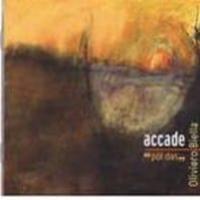 Sale!
Sale! Oliviero Biella
Accade ‘pöl das’
Protagonist in projects such as Magam, Bandalpina, and Compagnia Strumentale Tre Violini, the guitar player and musician from Lombardy has…
Read more Add to cart
